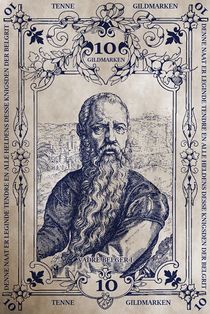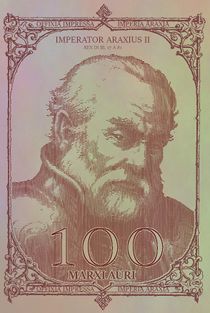Difference between revisions of "Currencies"
| (8 intermediate revisions by the same user not shown) | |||
| Line 1: | Line 1: | ||
{{Note|1=The people of Delgar use [[octal math]]. | {{Note|1=The people of Delgar use [[octal math]]. | ||
| − | For simplicity, when playing D&D 5E, currency denominations are all | + | For simplicity, when playing D&D 5E, currency denominations are all decimalized so 100 bits = 10 drakes = 1 mark.}} |
| − | + | Many different currencies were used prior to the founding of the [[Araxian Empire]] and the growth of Belgritian trade. Since about the 2nd century AY, Belgritian Marks and Araxian Marxi have been used almost everywhere. This article will focus primarily on these modern currencies rather than ancient ones, which are valued either for their unique historical significance or simply their precious metal content. | |
| − | + | == Belgritian Marks and Araxian Marxi == | |
| + | [[File:Belgritian 10 gold mark note.jpg|thumb|314x314px|Belgritian 10<sub>8</sub> gold mark note, featuring a portrait of [[Father Belger I]].]] | ||
| + | [[File:Araxian 100 gold mark banknote.jpg|thumb|313x313px|Araxian 100<sub>8</sub> gold mark banknote featuring a portrait of [[Araxius II]]. Araxian banknotes possess an anti-counterfeiting enchantment that gives them an iridescent appearance. Because of this enchantment, it is illegal to carry such currency into [[Dhol]].]] | ||
| + | Belgritian and Araxian currencies differ in appearance, but they are commonly traded one-to-one. Araxian currency is preferred throughout the [[Araxian Empire]], while Belgritian currency is preferred almost everywhere else. Both currencies come in six common denominations: | ||
| − | + | * '''Copper coins (bits/pixi)''', the smallest unit | |
| − | + | * '''Silver coins (drakes/draxi)''', equal to 10<sub>8</sub> (8) copper bits/pixi each | |
| − | + | * '''Gold coins (marks/marxi)''', equal to 20<sub>8</sub> (16) silver drakes/draxi each | |
| − | Belgritian and Araxian marks | + | * '''10<sub>8</sub> mark banknotes''', equal to 8 marks each. |
| + | * '''100<sub>8</sub> mark banknotes''', equal to 64 marks each | ||
| + | * '''1000<sub>8</sub> mark banknotes''', equal to 512 marks each | ||
| + | |||
| + | Banknotes in larger denominations such as 2000<sub>8</sub> (1024) and even 10,000<sub>8</sub> (4096) exist, but are rarely used. Belgritian and Araxian banknotes are typically taller than they are wide, approximately the size of an A6 sheet of paper (about 4x6"). | ||
| + | |||
| + | Use of coins for anything of significant value (10<sub>8</sub> marks or more) is very unusual due to the inconvenience of carrying bags of metal disks around. Use of coins for anything beyond small transactions usually marks someone as an adventurer or a pauper. | ||
| − | + | == Trethian Blessings == | |
| − | + | Devout followers of Treth believe that all exchanges must be equal. They consider charity and gift-giving to be technically forms of theft (from the self), but of course no kind-hearted person wants to act as selfishly as rigorous adherence to that principle would seem to demand. As such, they have devised a unique form of debt which is encapsulated in a currency called Blessing. One Blessing is defined to be worth one act of kindness and generosity, however large or small. When a devout Trethian gives a gift, whether to a friend or a beggar, it is accompanied by a single Blessing. The recipient is expected to repay that gift, not to the giver, but to someone else in need, to "pay it forward" one might say. The debt thus paid, the coin is intended to be pressed between the palms in prayer. The metal from which the coins are made (gallium) easily melts from the warmth of the hands. This lump of metal can be handed in at any temple of Treth in exchange for an equal weight of silver. In practice, many who receive Blessings simply turn them in immediately for the silver. | |
| − | |||
| − | |||
| − | |||
| − | |||
| − | + | It is worth mentioning here, though it doesn't relate to Blessing directly, that followers of Treth are not opposed to taxation. Taxation is simply money exchanged in return for public services. Treth's tenets do not require that an exchange be voluntary in order to be equal, only that that lack of volition be considered in the exchange - since nobody is free to dodge taxes, that loss of freedom must be repaid with freedom of a different kind, such as the freedom of safe passage within the realm, or the freedom to access healing magic at any temple of Hadros. | |
| − | + | == Wrythian Soul-Debt == | |
| + | Being cut off from the rest of the world, Wryth has developed a form of isolationist self-sufficiency and does not participate in global trade. In addition, through the mastery of many forms of magic, they have moved beyond almost all forms of scarcity. As such, Wrythians have little use for traditional currency. In the city of Narthrall, debts are tracked and accounted using a form of telepathy that all Dark Elves have access to. This is called "the weight of one's soul." Incurring debt makes one's soul "heavier." Paying off those debts makes their soul "lighter." By weighing another's soul, any Dark Elf can be assured (or not) that another will honor their promises. | ||
Latest revision as of 01:18, 1 December 2022
Note: The people of Delgar use octal math.
For simplicity, when playing D&D 5E, currency denominations are all decimalized so 100 bits = 10 drakes = 1 mark.
Many different currencies were used prior to the founding of the Araxian Empire and the growth of Belgritian trade. Since about the 2nd century AY, Belgritian Marks and Araxian Marxi have been used almost everywhere. This article will focus primarily on these modern currencies rather than ancient ones, which are valued either for their unique historical significance or simply their precious metal content.
Belgritian Marks and Araxian Marxi


Belgritian and Araxian currencies differ in appearance, but they are commonly traded one-to-one. Araxian currency is preferred throughout the Araxian Empire, while Belgritian currency is preferred almost everywhere else. Both currencies come in six common denominations:
- Copper coins (bits/pixi), the smallest unit
- Silver coins (drakes/draxi), equal to 108 (8) copper bits/pixi each
- Gold coins (marks/marxi), equal to 208 (16) silver drakes/draxi each
- 108 mark banknotes, equal to 8 marks each.
- 1008 mark banknotes, equal to 64 marks each
- 10008 mark banknotes, equal to 512 marks each
Banknotes in larger denominations such as 20008 (1024) and even 10,0008 (4096) exist, but are rarely used. Belgritian and Araxian banknotes are typically taller than they are wide, approximately the size of an A6 sheet of paper (about 4x6").
Use of coins for anything of significant value (108 marks or more) is very unusual due to the inconvenience of carrying bags of metal disks around. Use of coins for anything beyond small transactions usually marks someone as an adventurer or a pauper.
Trethian Blessings
Devout followers of Treth believe that all exchanges must be equal. They consider charity and gift-giving to be technically forms of theft (from the self), but of course no kind-hearted person wants to act as selfishly as rigorous adherence to that principle would seem to demand. As such, they have devised a unique form of debt which is encapsulated in a currency called Blessing. One Blessing is defined to be worth one act of kindness and generosity, however large or small. When a devout Trethian gives a gift, whether to a friend or a beggar, it is accompanied by a single Blessing. The recipient is expected to repay that gift, not to the giver, but to someone else in need, to "pay it forward" one might say. The debt thus paid, the coin is intended to be pressed between the palms in prayer. The metal from which the coins are made (gallium) easily melts from the warmth of the hands. This lump of metal can be handed in at any temple of Treth in exchange for an equal weight of silver. In practice, many who receive Blessings simply turn them in immediately for the silver.
It is worth mentioning here, though it doesn't relate to Blessing directly, that followers of Treth are not opposed to taxation. Taxation is simply money exchanged in return for public services. Treth's tenets do not require that an exchange be voluntary in order to be equal, only that that lack of volition be considered in the exchange - since nobody is free to dodge taxes, that loss of freedom must be repaid with freedom of a different kind, such as the freedom of safe passage within the realm, or the freedom to access healing magic at any temple of Hadros.
Wrythian Soul-Debt
Being cut off from the rest of the world, Wryth has developed a form of isolationist self-sufficiency and does not participate in global trade. In addition, through the mastery of many forms of magic, they have moved beyond almost all forms of scarcity. As such, Wrythians have little use for traditional currency. In the city of Narthrall, debts are tracked and accounted using a form of telepathy that all Dark Elves have access to. This is called "the weight of one's soul." Incurring debt makes one's soul "heavier." Paying off those debts makes their soul "lighter." By weighing another's soul, any Dark Elf can be assured (or not) that another will honor their promises.